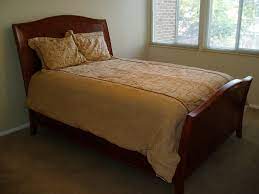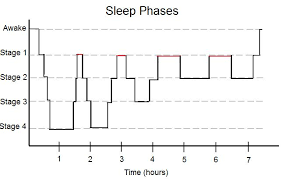How Does Poor Sleep Rob Vitality And Health?
Video Link: https://vimeo.com/183549354
Video Download: Poor Sleeping Habits 2
Video Stream: Poor Sleeping Habits 2
Recognizing Poor Sleeping Habits
We all know how it feels to have a rough morning. You wake up from your slumber, and it's much easier just to turn over and hit the snooze button. Sometimes it can be a struggle to even open your eyes.
 Hopefully, you're one of those people that only feels that way every once in a while, but we understand that many people have significant trouble getting out of bed regularly.
Hopefully, you're one of those people that only feels that way every once in a while, but we understand that many people have significant trouble getting out of bed regularly.
Some people think of it as a form of laziness, but there are a lot of reasons why poor sleeping habits can be chronic and problematic, without it necessarily being some sort of character flaw, as it is so often characterized.
How Did You Feel This Morning?
Think about how it felt to wake up this morning? Was it a struggle to throw off your blankets? What did you do yesterday? Did you spend the afternoon helping your friend move into a new apartment Maybe you were so exhausted that you needed to get a little extra rest to recover?
Or maybe the room was particularly cold, and it felt so wonderful under the blankets that it took every ounce of your resolve to leave your wonderfully warm and comfortable bed. Maybe it was something going on in your head?
We've all had those nights we spent tossing and turning because of anxious thoughts we just couldn't evacuate from our minds. There are perfectly normal reasons why we have trouble sleeping sometimes, but there are many reasons why we sleep poorly that can have a powerful effect on our overall health and well-being.
Sleeping difficulties are a significant problem for many men and women across the country. Many people don't really understand why they have trouble sleeping, but they know it's harming their life.
Specialists spend their entire careers working with patients to help promote healthier rest patterns. In terms of so many aspects of our health, healthy sleep is the lynchpin that helps maintain us in peak condition. The rest of this article will be concerned with various root causes which hurt regular sleeping habits.
Common Sleeping Problems
Not Enough Sleep
This should seem pretty obvious, but if you don't sleep the seven to nine hours your body naturally requires, you will start to slip. Your body goes through a natural sleep cycle, slipping from REM sleep to multiple deep sleep stages.
All these sleep stages are critical and restorative, and if you don't sleep long enough, your body will suffer because you don't spend the necessary amount of time rejuvenating through each phase of sleep. Just restructuring your life to be able to sleep for a whole night can do wonders for your health.
Abnormal Sleeping Patterns
There are a ton of careers out there that don't permit you to establish a normal and healthy sleep pattern. Doctors and nurses work long hours and often are required to flip their entire schedules on a day's notice. Firefighters and EMTs must remain on call for long hours, finding short respites of sleep interrupted by high adrenaline periods of activity. For sleep to be most restorative, your body must adhere to a healthy pattern.
are required to flip their entire schedules on a day's notice. Firefighters and EMTs must remain on call for long hours, finding short respites of sleep interrupted by high adrenaline periods of activity. For sleep to be most restorative, your body must adhere to a healthy pattern.
Hormone levels rise and fall throughout the day, controlling hunger, fatigue, and energy levels, and if your schedule is too all over the place, you may find yourself with energy rushing through your veins just when you lay your head down to rest.
Although there is only so much you can do regarding regularizing your sleeping patterns in many cases, make every effort to establish sleeping habits as close to normal as possible.
Atypical Circadian Rhythm
If you have allowed your sleeping habits to get off track, you may have actually hijacked your own Circadian Rhythm. The Circadian Rhythm is naturally optimized for nighttime rest, but if you work the second or third shift, stay out too late with friends, or do anything that causes you to regularly fall asleep at a strange time, your body will actually re-adapt to your new circumstances.
This means that if you get a new 9-5 job or if you otherwise have to wake up at a regular and decent hour, your body will grind its gears, slow to recalibrate to sudden alterations in your sleep schedule.
Bad Sleep Hygiene
There are a lot of things that you do throughout the day that wreck your regular sleeping habits without you even realizing it. Do you watch television in the bedroom? Do you drink caffeine within three hours of bedtime? Do you give in and take a nap in the afternoon? All of these seemingly innocuous decisions can prevent you from getting the most out of your night's rest.
Even having a large dinner or exercising just before bed can negatively impact your resting patterns. As you fall asleep, your muscles relax, and your digestive system slows to a crawl. Falling asleep with a lot in your stomach or right after a long and hard workout can lead to a restless night.
Obstructive Sleep Apnea
Sleep Apnea is a severe medical condition that affects many men and women across the United States.
Sleep Apnea primarily affects obese individuals but can actually be a problem for anyone. Sleep Apnea is a condition caused by anything obstructing  your airways as you try to sleep. Minor Sleep Apnea can be as simple as a chronic snore, but for some people, it actually causes them to suffocate for brief periods throughout the night before gasping for fresh air.
your airways as you try to sleep. Minor Sleep Apnea can be as simple as a chronic snore, but for some people, it actually causes them to suffocate for brief periods throughout the night before gasping for fresh air.
Sleep Apnea wreaks havoc upon the body and is one of the leading causes of Testosterone Deficiency in males. It also disrupts Human Growth Hormone production, which can harm the energy levels of both sexes. Even though Sleep Apnea is a severe and potentially chronic condition, multiple effective ways exist to treat and alleviate the disorder.
For obese patients, losing weight is the best way to resolve Sleep Apnea. There are also masks that actively circulate fresh air into the nostrils and mouth, allowing you to get all the oxygen you need to sleep soundly. Surgery is also an available option for patients with severe sleep apnea not directly caused by obesity.
Restless Leg Syndrome
Restless Leg Syndrome is a little-understood medical condition that can harm healthy sleep. The primary symptom of RLS is precisely what it sounds like: during sleep, a patient feels sensations that cause them to compulsively want to move their legs or arms during sleep. The condition is obviously neurological in nature, but researchers have yet to discover a clear cause.
Around one in ten people in the United States suffer from Restless Legs Syndrome. Although doctors don't have a firm idea of why RLS happens, there are ways to ease the symptoms of the condition, such as exercising more often, sleeping more regularly, decreasing caffeine use, or massaging the legs before bed.
Medical Side-Effects
There are many medications that can lead directly to disrupted sleeping habits. A few types of drugs that can disrupt healthy sleep are allergy medications, blood pressure medications, and anti-depressants.
If you are having trouble sleeping, consider what drugs you are currently on, and talk to your doctor about choosing another treatment option or changing the means of taking medication. Some medicines, for example, can disrupt sleep when taken orally, but when delivered directly to the lungs, it has no disruptive effect.
Untreated Psychiatric Issues
Men and women with elevated levels of anxiety or depression are at higher risk of sleeping poorly, which can even exacerbate the primary condition. Psychological conditions tend to make the brain go into overdrive at the worst times, especially when you are alone.
If you are chronically depressed or sad, getting treatment can help you sleep better, and the combination of therapeutic treatment and improved sleeping habits can significantly improve your health and outlook on life.
Delayed Sleep Phase Disorder and Advanced Sleep Phase Disorder
As researchers learn more about conditions related to Circadian Rhythm Disruption, they find that there are underlying biological reasons why their sleeping patterns are different than the norm. Advanced Sleep Phase Disorder and Delayed Sleep Phase Disorder are a few examples of conditions caused by a disruption of the Circadian Rhythm.
ASDP is a condition in which individuals get sleepy very early and tend to wake up earlier than expected. DSPD is caused when individuals have trouble falling asleep until later than usual and wake up later as well.
These conditions are believed to result from a biological clock that is simply out of time with most humans. Although these disorders are often chalked up to poor habits, they can actually be biologically-induced conditions.
to poor habits, they can actually be biologically-induced conditions.
These conditions also correlate with an increased risk of severe medical disorders such as diabetes and cardiovascular disease. Diabetes has also been strongly correlated with an increased risk of sleep apnea.
Sleep Often Troubled by Multiple Issues
Although all of these issues can negatively affect sleep, the problem is that most people who sleep poorly have trouble for multiple reasons. The more sophisticated the views on poor sleep become in the medical community, the more it becomes clear that many issues which have a disruptive effect on sleep are interconnected, and finding the root cause or causes of poor sleep is the most effective way of contributing to a typical night's sleep.
What Can I Do to Sleep Better?
Sleeping well is undeniably essential to living a healthy life. If you are having trouble sleeping well, read through this list of common causes and see which issues apply to you. If your sleeping problems are clearly the result of an underlying medical condition such as sleep apnea or medications you are taking, don't be afraid to talk to a doctor.
If you feel that your sleeping problems are the result of your own taking healthy sleep for granted, the following are some healthy steps to get your sleep patterns back on track:
Make a concerted effort to sleep better- One of the most important things you can do is simply prioritize sleep more highly, making the conscientious choice to sleep better.
Lights Out The healthiest sleep occurs in the darkest of the night. Eliminate all sources of light from your sleeping area. Even cover up your alarm clock.
No Caffeine After 4 pm. Caffeine stays in your system for a notoriously long time. By avoiding caffeine in the early and late evening, you can detox and make it easier to sleep.
Have a Light Dinner A heavy stomach can make sleep very restless. The digestive system works slowly at night, and falling asleep with a full stomach is far from optimal.
No Work or Play in the Bedroom The brain is a complex thing. If you like to watch television, work on your homework, or play on your phone in bed, this can prevent your brain from adequately associating the bedroom with sleep.
Consider Melatonin- If you are in the process of correcting poor sleeping habits, Melatonin can be a valuable tool to recalibrate your system. Only use recommended doses, however, because taking too much can hurt sleep.
For most people, combining these steps will be pretty successful in improving their sleeping habits and their ability to wake up ready for anything. If you still have trouble sleeping even after taking these proactive measures, your doctor can work with you to uncover any underlying conditions which may be impacting your sleep.
If All Else Fails, Talk to Your Doctor!
Remember: There is no reason to resign yourself to a lifetime of poor sleep. You will age faster, be less productive, and ultimately be less happy. Take the necessary steps to optimize your sleep to the necessities of your life, and your body and mind will thank you for it in the long run.

- Xylitol is a Natural, Plant-Sourced and Low-Calorie Sweetener [Last Updated On: January 8th, 2025] [Originally Added On: January 12th, 2021]
- The Secret Behind Keeping the Weight Off for Good -- No More Losing and Gaining Cycles! [Last Updated On: January 17th, 2025] [Originally Added On: January 13th, 2021]
- The Cognitive Benefits of Starting a CoQ10 (Coenzyme Q10) Supplement Regimen [Last Updated On: January 12th, 2025] [Originally Added On: January 14th, 2021]
- It's Time to Understand Why Vitamin C is Critical for Our Health and Longevity! [Last Updated On: January 10th, 2025] [Originally Added On: January 15th, 2021]
- Snoring is the Most Common Early Symptom of Sleep Apnea -- Do You Suffer From It? [Last Updated On: January 11th, 2025] [Originally Added On: January 16th, 2021]
- Vitamin-d Longevity Vitamin [Last Updated On: January 2nd, 2025] [Originally Added On: January 17th, 2021]
- Twenty Simple Weight Loss Tips That Can Change Your Life [Last Updated On: January 1st, 2025] [Originally Added On: January 18th, 2021]
- Twelve Ways To Control Cravings [Last Updated On: February 22nd, 2025] [Originally Added On: January 19th, 2021]
- The Truth About The Zone Diet [Last Updated On: January 1st, 2025] [Originally Added On: January 20th, 2021]
- The Truth About The Schwarzbein Principle [Last Updated On: December 31st, 2024] [Originally Added On: January 21st, 2021]
- The Truth About The Realage Diet [Last Updated On: December 31st, 2024] [Originally Added On: January 22nd, 2021]
- The Truth About The Origin Diet [Last Updated On: December 30th, 2024] [Originally Added On: January 23rd, 2021]
- The Truth About The Eat Right, Live Longer Diet -- Nourishing Food Equals Increased Longevity [Last Updated On: January 31st, 2025] [Originally Added On: January 24th, 2021]
- The Essential Roles Magnesium Plays For Our Energy Levels, Skin Youthfulness and Mental Health [Last Updated On: January 4th, 2025] [Originally Added On: January 25th, 2021]
- The Real Skinny On Vitamin B12. What It Can And Cannot Do For You [Last Updated On: March 23rd, 2025] [Originally Added On: January 26th, 2021]
- The Importance And Purpose Of Stress [Last Updated On: February 18th, 2025] [Originally Added On: January 27th, 2021]
- The Ideal Balanced Diet The Reality Of Healthy Eating [Last Updated On: December 30th, 2024] [Originally Added On: January 28th, 2021]
- The Effects Of Cortisol On The Body [Last Updated On: July 28th, 2024] [Originally Added On: January 29th, 2021]
- Sixteen Common Foods That Increase The Cancer Risk [Last Updated On: December 29th, 2024] [Originally Added On: January 30th, 2021]
- Should You Consider Intermittent Fasting? [Last Updated On: November 24th, 2024] [Originally Added On: January 31st, 2021]
- Can Caloric Restriction Help You Lose Weight And Live Longer? [Last Updated On: November 24th, 2024] [Originally Added On: February 1st, 2021]
- Nine More Natural Ways To Relieve Anxiety [Last Updated On: November 24th, 2024] [Originally Added On: February 3rd, 2021]
- Metabolism Boosting Tips For Losing Weight And Feeling Great [Last Updated On: November 22nd, 2024] [Originally Added On: February 4th, 2021]
- Juicing Pros And Cons [Last Updated On: March 22nd, 2025] [Originally Added On: February 5th, 2021]
- Insomnia Guide [Last Updated On: November 21st, 2024] [Originally Added On: February 6th, 2021]
- How To Lose Weight With Human Growth Hormone [Last Updated On: November 20th, 2024] [Originally Added On: February 7th, 2021]
- How Safe Is Monosodium Glutamate AKA Msg? [Last Updated On: November 23rd, 2024] [Originally Added On: February 8th, 2021]
- How Is Sleep Apnea Diagnosed And Treated [Last Updated On: November 18th, 2024] [Originally Added On: February 9th, 2021]
- Hidden Sources Of Sugar In Common Foods [Last Updated On: November 17th, 2024] [Originally Added On: February 10th, 2021]
- How Would You Like to Potentially Add 14 Healthy and Youthful Years to Your Life Span? [Last Updated On: November 19th, 2024] [Originally Added On: February 11th, 2021]
- Four Reasons Why Healthy Sleep Encourages Weight Loss [Last Updated On: November 16th, 2024] [Originally Added On: February 12th, 2021]
- Omega-3 Fatty Acid Facts And How They Relate To Hormone Replacement Therapy [Last Updated On: July 25th, 2024] [Originally Added On: February 14th, 2021]
- Drink Right To Live Well [Last Updated On: November 15th, 2024] [Originally Added On: February 15th, 2021]
- Consumers Of Processed Meat Put Themselves At Risk [Last Updated On: November 14th, 2024] [Originally Added On: February 16th, 2021]
- Comparing The Same Mass Of Muscle And Fat [Last Updated On: February 19th, 2025] [Originally Added On: February 17th, 2021]
- Watermelon Health Food? The Benefits Of L-citrulline And Watermelon [Last Updated On: November 13th, 2024] [Originally Added On: February 18th, 2021]
- Alcohol Appears To Impact Sperm Quality [Last Updated On: November 12th, 2024] [Originally Added On: February 19th, 2021]
- The Benefits of Selenium - Should You Take a Selenium Supplement? [Last Updated On: February 9th, 2025] [Originally Added On: April 8th, 2021]
- Selenium and its Impact on Your Health and Hormones [Last Updated On: March 3rd, 2025] [Originally Added On: April 8th, 2021]
- Scientifically Proven Benefits Of Turmeric The Indian Spice [Last Updated On: March 18th, 2025] [Originally Added On: April 27th, 2021]
- Natural Remedies for Heartburn or Acid Reflux [Last Updated On: February 18th, 2025] [Originally Added On: May 22nd, 2021]
- What the Heck Is a Raisin, Anyway and Why Would I Want to Eat One? [Last Updated On: August 18th, 2024] [Originally Added On: June 10th, 2021]
- Fat-Focused Diet May Help Boost Testosterone [Last Updated On: February 17th, 2025] [Originally Added On: June 10th, 2021]
- Chia Seeds: More Than Just a Fad [Last Updated On: July 12th, 2024] [Originally Added On: June 24th, 2021]
- Intermittent Fasting Boosts Growth Hormone, and Improves Cognitive Health [Last Updated On: March 4th, 2025] [Originally Added On: May 2nd, 2022]
- Growth Hormone, Nutrition, and Diet Affect Longevity [Last Updated On: February 14th, 2025] [Originally Added On: May 6th, 2022]
- How Your Health is Affected by Brown and White Fat [Last Updated On: February 14th, 2025] [Originally Added On: May 17th, 2022]
- Tesamorelin Boosts HGH Levels and Burns Belly Fat [Last Updated On: February 14th, 2025] [Originally Added On: May 21st, 2022]
- Build Muscle With Tofu - Don't Fear Soy [Last Updated On: December 29th, 2024] [Originally Added On: July 12th, 2022]
- Balancing HGH Levels with Weekly Sogroya [Last Updated On: December 28th, 2024] [Originally Added On: September 1st, 2022]
- Pecans Are Amazing [Last Updated On: February 19th, 2025] [Originally Added On: November 22nd, 2022]
- The Benefits of Fenugreek [Last Updated On: October 14th, 2024] [Originally Added On: November 24th, 2022]
- The Foods To Eat To Increase Stem Cells [Last Updated On: March 6th, 2025] [Originally Added On: December 7th, 2022]
- The Versatility of Pecans [Last Updated On: February 19th, 2025] [Originally Added On: February 9th, 2025]
- Understanding The Concept: A Pound Of Muscle Vs. A Pound Of Fat [Last Updated On: February 19th, 2025] [Originally Added On: February 11th, 2025]
- The Aging Enigma: Unravelling the Web of Human Growth Hormone Decline [Last Updated On: February 17th, 2025] [Originally Added On: February 12th, 2025]
- Rekindling the Flame: How a Fat-Friendly Diet Can Ignite Testosterone Levels [Last Updated On: February 14th, 2025] [Originally Added On: February 13th, 2025]
- Unlocking Your Inner Fountain of Youth: The Magic Elixir of HGH Injections for Women [Last Updated On: February 17th, 2025] [Originally Added On: February 14th, 2025]
- Effective Strategies for Controlling Cravings [Last Updated On: February 17th, 2025] [Originally Added On: February 17th, 2025]
- Overview of Hormone Replacement Therapy and the Role of Intermittent Fasting [Last Updated On: February 22nd, 2025] [Originally Added On: February 22nd, 2025]
- Understanding the Power of Stem Cells [Last Updated On: February 24th, 2025] [Originally Added On: February 24th, 2025]
- The Role of Selenium in Health and Hormones [Last Updated On: February 26th, 2025] [Originally Added On: February 26th, 2025]
Word Count: 1992







